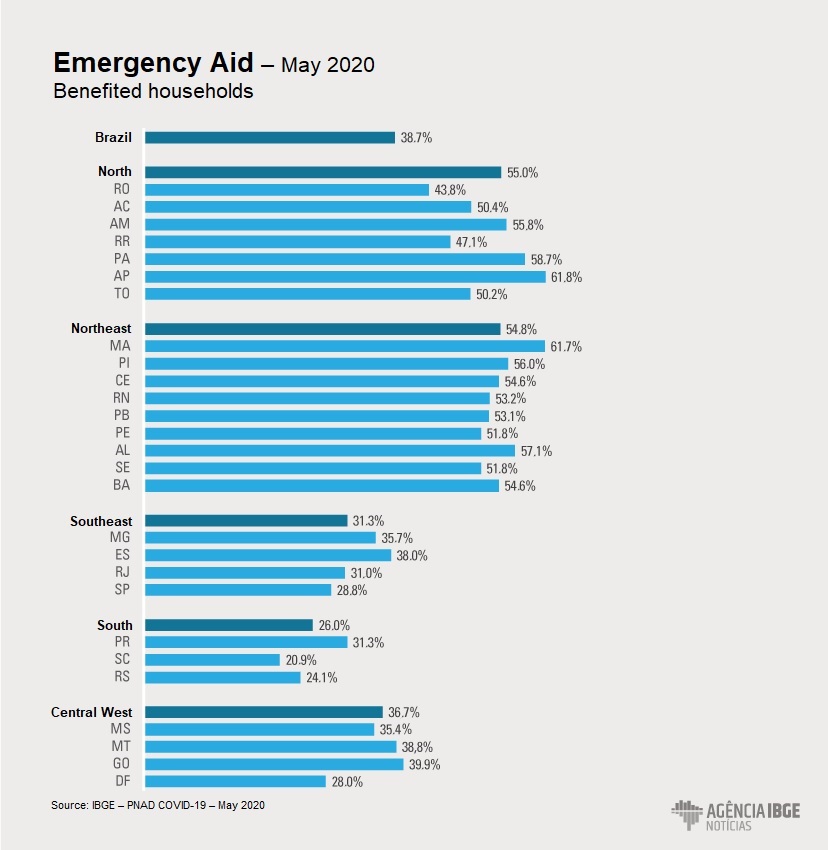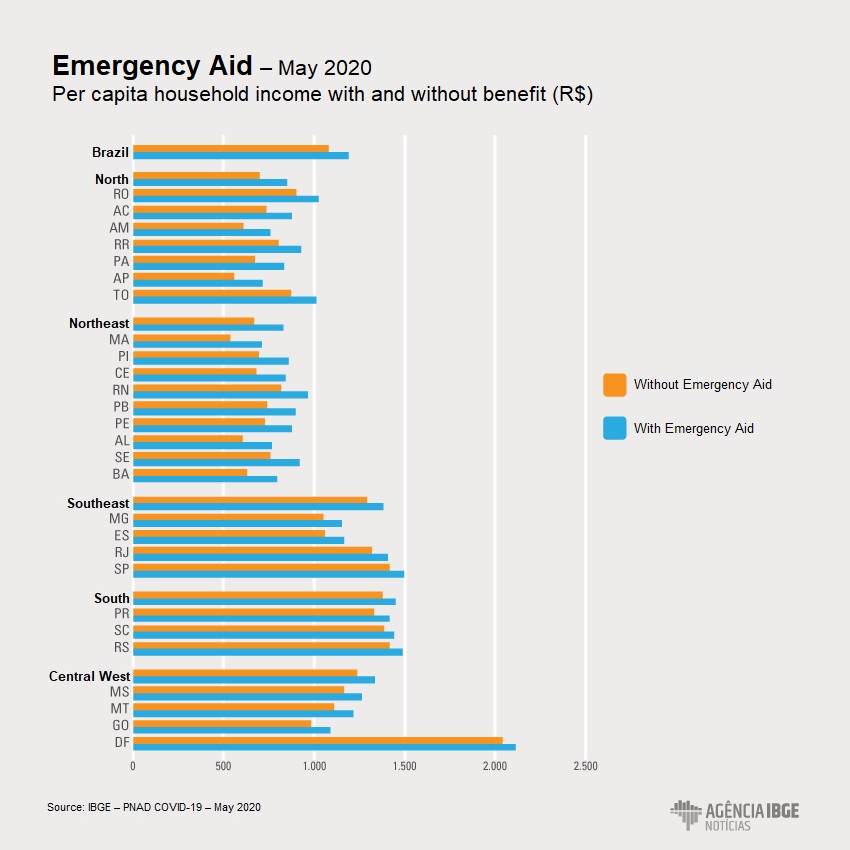PNAD COVID19
More than 76% of resources of Emergency Aid reached the lowest income strata in May
June 29, 2020 01h00 PM | Last Updated: June 30, 2020 12h26 PM
The IBGE´s Monthly PNAD COVID19 unveils that, of the 68 million existing households in Brazil, 38.7% (26.3 million households) benefited from the Emergency Aid in May, which aims at providing social protection in the period of the crisis caused by the pandemic of the novel coronavirus. In population terms, 45% of the 210 million inhabitants, nearly 94 million persons, live in households where at least one resident received the benefit. According to PNAD COVID19, R$23.5 billion were distributed in May, especially to those that are in the lowest strata of the population, whose household income did not surpass R$645.54 that month, which represented 76.2% of the resources.
The data of the Monthly PNAD COVID19 were released last Wednesday (24), less than three months after the implementation of the Emergency Aid, aiming at showing the effects of the pandemic on the labor market and on the population income, thus producing information needed to develop specific support programs or public policies in general. These first results include detailed estimates on the coverage and focus of the program. The Emergency Aid is destined to informal workers, individual micro-entrepreneurs (MEI), self-employed workers and unemployed persons.

In the states of the North and Northeast regions, the percentage of households benefited with the Emergency Aid surpassed 40%. In Amapá and Maranhão, the proportion of benefited persons was higher than 60%. In São Paulo, Santa Catarina, Rio Grande do Sul and in the Federal District, states whose per capita household earnings are the highest ones, the coverage of the program did not reach 30% of the households.
"Questions related to the Emergency Aid were included. As a huge income transfer program, it required an assessment apart from the other existing programs. To receive the Emergency Aid, the persons have to meet some criteria, such as: the per capita household income does not surpass R$522.50 or the total household income does not surpass three minimum wages (R$3,135.00)," reminds Cimar Azeredo, IBGE´s deputy director of Surveys.
The survey shows that, in the first income bracket, Brazil has 21 million persons who live in households with a household income up to R$56.62. Sixteen million persons, the equivalent to 72% of this bracket, live in households that received the benefit. To this contingent, which changed from a per capita household income of R$10.64 to R$238.03, the impact of the benefit was equivalent to a "gain" above 2,136%.
In the second income bracket (up to R$233.18), 81.1% of the households were reached, contemplating 17 million out of the 21 million homes within this bracket. Having changed the per capita income from R$146.08 to R$352.85, it produced a positive impact equivalent to 141.6%. Nearly half of the 23 million persons living in households whose per capita household income did not surpass R$645.54 were contemplated.

Higher brackets
Leonardo Santos de Oliveira, an IBGE´s analyst of income, explains that the brackets of higher income – from the sixth, with income of R$832, up to the tenth, for those with income above R$2,275.13 – possibly received the benefit due to the floating nature of their earnings, like self-employed workers. "There are many factors. We are living a moment different from everything seen before. People can move from poverty to other income brackets. A self-employed worker can have earnings in a month and no income in another period. Such persons may need resources in a month and access the program; in the next month, they can have a little more income. Every social program has fluctuations, and, in pandemic times, such fluctuation can be even bigger.", clarifies Oliveira.
"According to PNAD COVID19, 85% of the resources were destined to persons whose per capita household earnings were below 1 minimum wage," states Adriana Beringuy, an IBGE economist. "The concentration of the resources in the lowest income strata points out the right focus of the program, since the lack of this benefit could considerably compromise the consumption capacity of many families. Furthermore, the guarantee of a basic consumption enables the demand for goods and services, allowing producers to maintain their operations and the employment level", adds Beringuy.

Record time
Eduardo Rios Neto, IBGE´s director of Surveys, one of the creators of the survey, assesses that PNAD COVID19 is a survey developed in record time, with a fixed sample and interview through telephone. "The IBGE is very proud of the speed in planning, developing and releasing it. In addition, it provides a weekly map of the condition of the flu syndrome and primary health care, of the labor market and of the income transfer policies, like the Emergency Aid. The release of this picture along the pandemic will lighten the public policies in every federation sphere," concludes Rios Neto.
Cimar Azeredo adds that, according to PNAD COVID19, more than half of the households of the North and Northeast regions were benefited. "And nearly 76% of the R$23 billion distributed in May 2020, appraised by the survey, were directed to those 50% of the population that are in the lowest income strata."
Despite such focus, the existence of a parcel of the population that is within the bracket eligible for this program and that was not receiving the benefit in May can be attributed to several factors. "For example, lack of required documentation and/or irregular documents, difficulties to access and fill the application due to illiteracy (either traditional or functional), difficulty to access the Internet, inability to solve pending issues or other reasons, which include processing and rule definition errors," said him.
Azeredo also states that every income transfer program requires a dynamic process of adjustment and improvement. "It would not be different with the Emergency Aid, one of the biggest direct income transfer programs ever implemented in Brazil. One cannot forget that the program was created in the middle of a pandemic and with all of its inherent challenges. It is an emergency program after all," stresses the IBGE director.




















